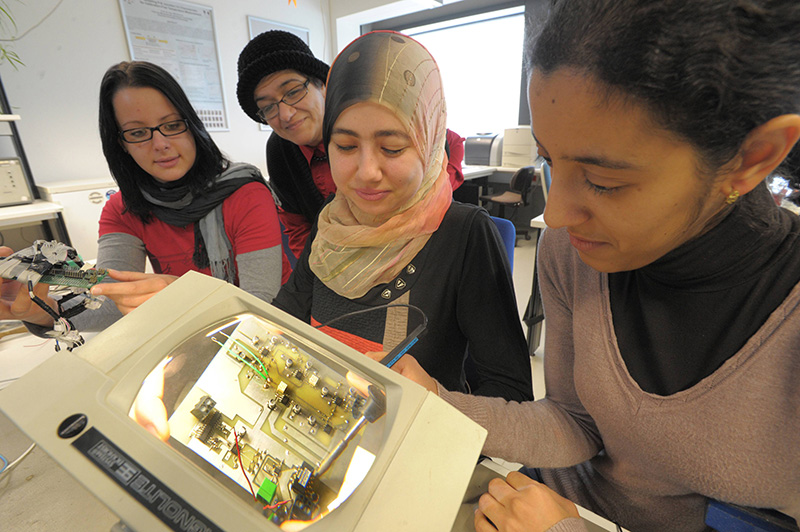More diversity as an opportunity and enrichment
Regionally rooted, internationally networked: The number of foreign students and PhD students has risen again – Rector has signed the “Chemnitz Charter for Diversity“ on the 5th of February 2015
-

The number of international students as well as doctoral students and employees increases – an enrichment for research and teaching - like here in the laboratory of the Faculty of Electrical Engineering and Information Technology. Photo: Photo Archive/Andreas Seidel
German universities are becoming increasingly heterogeneous, if one looks at the students and staff considering their ethnic origin, age and educational biography. “The diversity of people, who study and research together, also provides a huge potential for the further development within the global competition for the best minds at TU Chemnitz. It is an opportunity and an enrichment at the same time“, says the Rector of the TUC, Prof. Dr. Arnold van Zyl. Anyone walking through the campus of the Technische Universität Chemnitz or sitting in the cafeteria, will soon observe the many internationalities, that are united here and communicate with each other. The TU Chemnitz currently comprises of 19 percent of the international students – more than ever before. The number of initial and the number of new registrations grew from 202 in the winter term of 2009/2010 to 877 in the winter term of 2014/2015. The main countries of origin are currently India and China, followed by Pakistan, Iran, Russia and Vietnam. The most popular Bachelor study degrees are Mechanical Engineering, Economics and Business Administration and Automobile Production. In the Master section such degree programs as Micro and Nano Systems, Automotive Software Engineering and Information and Communication Systems are in high demand among foreign students.
A similar trend to that of students also applies to the number of foreign doctoral students, which has increased from 89 to 134 within the previous five years. The number of foreign staff has been doubled from 99 to 197 between 2009 and 2014 at the TU Chemnitz. “This shows how successfully we implement a demand for internationalization as a part of our university development plan“, says Prof. van Zyl, and adds: “The increasing international student exchange, transnational research cooperation and the increase of the mobility promote this positive development.“ A particular advantage is the involvement of the TU Chemnitz in a network of more than 130 partner institutions on all continents, including the Academic Consortium 21.
”We are confident that innovation and the efficiency of the university will be dependent on the wide variety of personalities and ideas in the future“, says the Rector. That is why, the TU Chemnitz will continue to even further strengthen the integration of the university in the international "Scientific Community". In order to ensure the continuous support and further improvement of international students, doctorates and researchers, the interlocking of several university’s institutions is indispensable. This includes, for instance, all faculties, the International Office, the Foreign Language Centre, the Student Council, the Student Service Point, the Central Course Guidance Service, the Central Examination Office, the Department of Human Resources and the Centre for Young Researchers. “I am very grateful to all actors for their work and for their involvement in this internationalization process for many years with persistence“, says Prof. van Zyl.
“The good news is that our foreign students rated their host university as above average – the most recent example of a survey conducted by the German Academic Exchange Service“, says Prof. van Zyl. In particular, the Student Buddy Program of the International Office, the support during enrollment, an Orientation Week, excursions as well as sporting and cultural activities received top grades. “Although our focus is being more heavily geared beyond domestic borders, we are aware of our roots in the region and our responsibility for the local people, businesses and institutions“, assures the Rector. In order to send another visible sign, he has signed the ”Chemnitz Charter for Diversity“ on February 5th 2015. ”This demonstrates the importance of diversity at our university“, says Prof. van Zyl, and adds: “The diversity of people and ideas that characterize and enrich our everyday life is a prerequisite for the promotion of a cosmopolitan city.”
(Author: Mario Steinebach, Translation: Nataliia Boiko)
Katharina Thehos
06.02.2015
- Naturwissenschaften
- , Mathematik
- , Maschinenbau
- , Elektrotechnik und Informationstechnik
- , Informatik
- , Wirtschaftswissenschaften
- , Philosophische Fakultät
- , Human- und Sozialwissenschaften
- , Universitätsrechenzentrum
- , Universitätsbibliothek
- , Zentrum für Lehrkräftebildung und Bildungsforschung
- , Studierende
- , International
- , Forschung
- , Chemnitz




